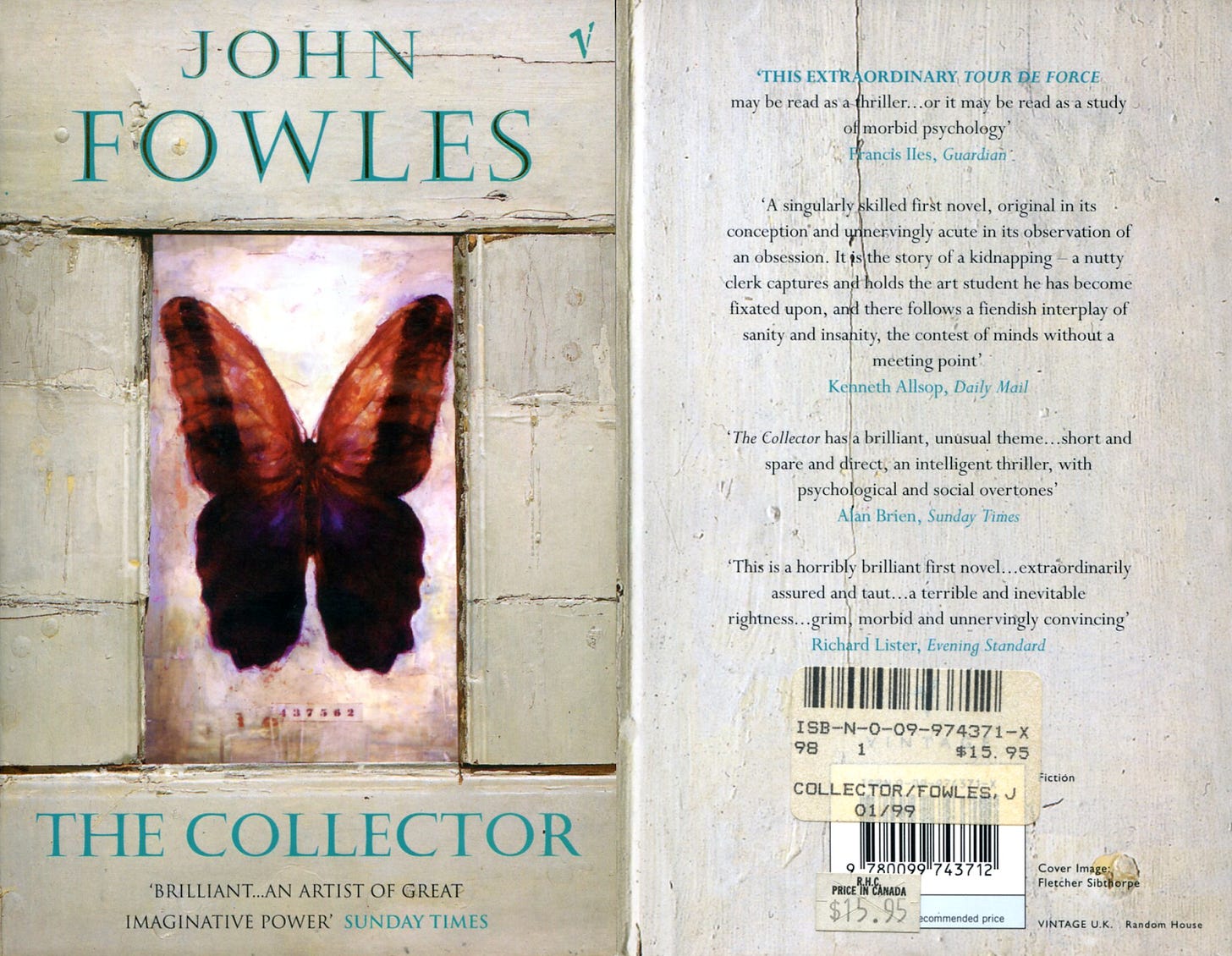Greetings, my fellow bibliophiles!
Today, I’m very excited to bring you
.Zork writes
, where his work is guided by the principle that everything in life is touched by politics. In his words, “We cannot be free without understanding the limitations it is imposing on us.” With every post he tries to light a candle to illuminate another dark corner of our lives.Today, Zork opens up about the book that arrived at the perfect moment, giving him hope during an incredibly difficult period in his life. A book that showed him he wasn’t alone in his struggle, and showed him the path he needed to take.
Trust me, you don’t want to miss this one.
—
It is a good question, whether books make us, or just find us when we need them most. When they can resonate the most with that moment in our lives. The Collector may not be the best book of my life, but to this day, no book affected me as profoundly as this one did when I read it in March 1969. I cannot explain the book or its impact on me without telling you how did I get to the point when we met……..
I was born a bastard at a time when that still mattered a lot. You can read more about it, if you care, in my post about abortion. I had a rough childhood with an abusive alcoholic as a stepfather. From the moment I could, I spent as much time away from home as possible. Sports, museums, chess club, any extracurricular activity I could sign up for. When I was ten, we moved to a nice neighbourhood with a good school. I liked school, it was not home. I had great friends. After eight grade most of my friends went to high-school. My parents did not allow me to apply. I had to choose a trade, so they could kick me out of home a year sooner. I lost my friends and I felt terribly alone in the working class. It was far more than teenage angst. I was just unable to relate to my environment; I felt out of place in some irreparable way. I was still diving competitively, but in February 1969, I got sick during training and eventually I was diagnosed with myocarditis. One month in a hospital, six more at home in bed, two years to full recovery. A week before I was released from the hospital a young nurse lent me a book. It was The Collector. I started reading it in the early afternoon, finished it by the morning. When I woke up, I started it again. In the next year I read it at least a dozen times. It was the perfect reflection of my world at that point. Living as a captive in the world of Caliban, aspiring for the world of Miranda.
Shakespeare’s Tempest is a prominent theme in the book. Prospero’s daughter is called Miranda, his half-human servant is called Caliban. Miranda, our book’s protagonist, refers to her captor as Caliban.
The blurbs of the book label it a thriller. It isn’t. Not really. A few pages into it you will know how it ends. It is not a crime story either. Is it psychological horror? Is it a study of class? It is all of it and none of it.
As I am writing this, I cannot get melody out of my head, the Gogol Bordello song: When Universes collide. That is what the book is about.
The collision between the limitations of Caliban and the potentials and promises of Miranda.
The petty and drab world of him and the colorful, rich world of her.
The book is written in four parts, all in the first person.
Part one is Ferdinand (Caliban) describing his world, his obsession with the young art-student and his luck that enables him to collect this rare specimen for himself.
Part two is Miranda’s account of her world, the events and her hopeless attempts to get a grip on the slime her captor is.
Part three and four are Ferdinand again, finding closure and a new beginning.
It is interesting to look back at the book and its effect on me. It amplified my desire to get out of my world. To accept the fact that I am different and alone; to embrace the fact that the baggage I have to carry is what makes me who I am.
The point of good books, good movies or good art of any kind are not their subjects; not even their creators or their world views, but us. The point is to help us understand and articulate our place in the world. No book did that to me with greater impact than The Collector.
It affected me in small ways as well. In several scenes, when Miranda visits G. P., they are listening to Indian classical music, which I have never heard before reading the book. The book made me seek it out and now I am hooked on it for life.
Being somewhat blinded by the resonance with my personal circumstances, I don’t know what this book may give you, but I am certain, that it will have an impact on you as well.
Epilogue:
One day in September, when my Caliban came home drunk and hit me for no reason, I hit back.
I ended up in government foster care and in a high-school.
Six years later, when I was 22, I moved back home to save my sister and mother from further abuse.
It took several beatings, but eventually I made him understand the new pecking order. I was victorious over my own Caliban but by then I’ve grown in so many ways that it didn’t really feel like a victory any more. It was just something I had to do.
A quote from the book:
“This morning I was imagining I'd escaped and that Caliban was in court. I was speaking for him. I said his case was tragic, he needed sympathy and psychiatry. Forgiveness.
I wasn't being noble. I despise him too much to hate him.”
I was in my mid-forties when I started having reoccurring dreams about my stepfather. It was always the same, me telling him: “It’s OK. I understand. Your life was f***ed up too. Don’t worry, I forgive you.”
If I inspired you to read the book, let me know what you think, once you are done.
writes .P.S. For more ways of getting your writing in front of new readers, consider becoming a paying subscriber today.






